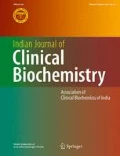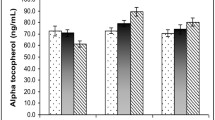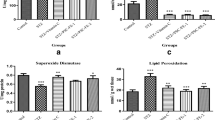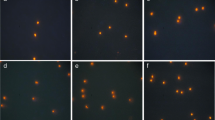Abstract
The objective of the present study is to evaluate the beneficial effect of tomatoes, which are rich source of Lycopene, relatively a new carotenoid known to play an important role in human health and disease. In this study lipid peroxidation rate was measured by estimating Malondialdehyde and the levels of serum enzymes involved in antioxidant activities like Super Oxide Dismutase, Glutathione Peroxidase, Glutathione Reductase, Reduced Glutathione, in type-II diabetic group (n=40) and age matched control group (n=50), and observed significantly lower levels of antioxidant enzymes and very high lipid peroxidation rate in type-II diabetes when compared to control group (p<0.001). Short term supplementation with tomatoes (cooked) to diabetic group for a period of 30 days, showed a significant improvement in antioxidant enzyme levels (p<0.001) and decreased lipid peroxidation rate (p<0.001) suggesting the supplementation with tomato lycopene may serve as the best method of preventing the oxidative stress in diabetic patients.
Similar content being viewed by others
References
Zimmet P Z, Mccarty D J, De Couten M P. The global Epidemiology of non insulin dependent diabetes mellitus and the metabolic syndrome. Journal of diabetes and its complications 1997; 11: 60–68.
Zimmet P Z, Lefebvre P. The global NIDDM epidemic. Diabetology 1996; 39: 1247–8.
J R Pfaffly. Review on Diabetic complications. Free radicals in biology and medicine 2001; 77: 222.
Baynes J W. Role of oxidative stress in development of complications in diabetes. Diabetes 1991; 40: 405–11.
Sies H and Stah W. Vitamin E, C, beta—carotene and other carotenoids as antioxidants. American Journal of Clinical Nutrition 1995; 62: 1315sup-1321sup.
Agrawal S and Rao A V. Tomato lycopene and low density lipoprotein oxidation a human dietary intervention study. Lipids 1998; 33: 981–4.
Agrawal S and Rao A V. Role of lycopene as antioxidant carotenoids in the prevention of chronic diseases, a review: Nutrition Research 1999; 19: 305–23.
Frederic Khachik, Lorena Carvalho, Paul S. Bernstein, Farth J. Muir. Chemistry, distribution and metabolism of tomato carotenoids and their impact on human health. Experimental Biology and Medicine 2002; 227: 845–51.
Jane E, Upritchard, Wayne H F, Sutherland Jim I Mann. Effect of supplementation with tomato juice, vitamin E and C on LDL oxidation and products of inflammatory activity in type-II diabetes. Diabetes Care 2000; 23: 733–8.
Ford ES, Will JC, Bowman BA, Narayan KM. Diabetes Mellitus and serum carotenoids findings from the third national and nutritional examination survey. American Journal of Epidemiology 1999; 149: 168–76.
Coyne T, Ibiebele TI, Baade PD, Dobson A, McClintock C, Dunn S et al. Diabetes mellitus and serum carotenoids: findings of a population-based study in Queens land, Australia. American Journal of Clinical Nutrition 2005; 82(3): 685–93.
Polidori M C, Polidori P, Mecocci W, Stahl B, Parente R, Cecchettti A et al. Plasma levels of lipophelic antioxidants in very old patients in type-II diabetes. Diabetes Metabolism and Research Review 2000; 16(1): 15–19.
McCord J M, Fridovich I. Super oxide dismutase: Journal of Biological Chemistry 1969; 244: 6049–6055.
Pagila D M, Valentine W N. Studies on the quantitative and characterization of erythrocyte Glutathione peroxidase. Journal of Laboratory and Clinical Medicine 1986; 20: 150–68.
Goldberg D M, Spooner RJ. Methods of enzymatic analysis. Bergmeyer H.V. 3rd edn. (1983) Volume 3 p258–65.
Butler E, Duron O, Kelly B M. Improved methods for determination of blood Glutathione. Journal of Laboratory and Clinical Medicine 1963: 61: 882–90.
Satoh K Serum lipid peroxide in cerebrovascular disorders determined by a new colorimetric method. Clinical Chemistry Acta 1978; 90: 37–43.
Di Mascio P Kaiser S, Sies H Lycopene as a most effective biological carotenoid singlet oxygen quencher. Archives of Biochemistry and Biophysics 1989; 274: 532–8.
Lenzi A, Picardo M, Gandini L, Lombardo F, Terminali O. Glutathione treatment of dyspermia: effect on lipoperoxidation process. Human Reproduction 1994; 9(11): 2044–2050.
Stahl W, Sies H. Uptake of lycopene and its geometrical isomers is grater from heat process than unprocessed tomato juice in humans. Journal of Nutrition 1992; 122: 2161–6.
Author information
Authors and Affiliations
Corresponding author
Rights and permissions
About this article
Cite this article
Subhash, K., Bose, C. & Agrawal, B.K. Effect of short term supplementation of tomatoes on antioxidant enzymes and lipid peroxidation in type-II diabetes. Indian J Clin Biochem 22, 95–98 (2007). https://doi.org/10.1007/BF02912889
Issue Date:
DOI: https://doi.org/10.1007/BF02912889




